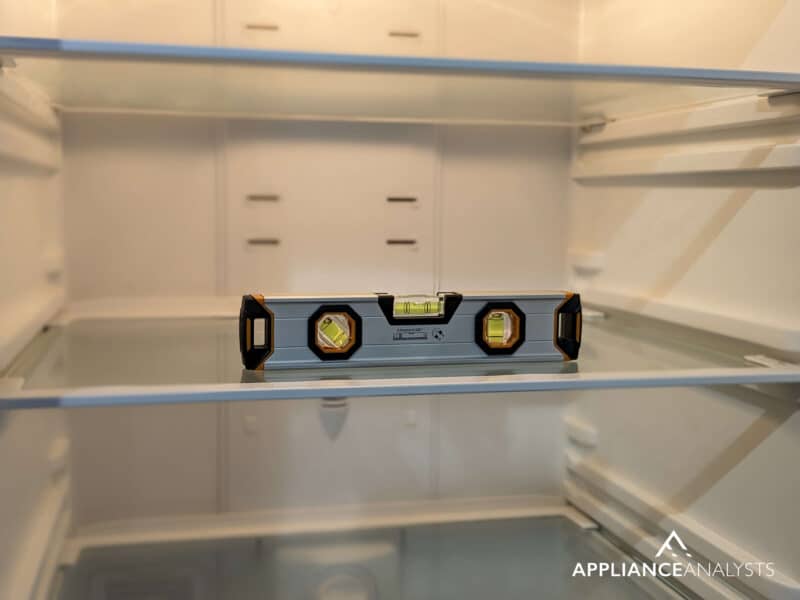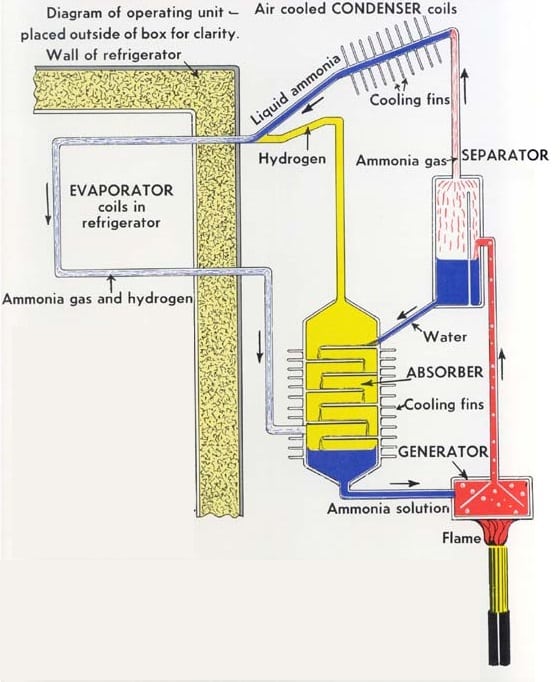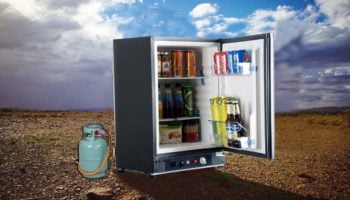Are you looking into getting a propane refrigerator, but want to know how efficient they actually are?
Good call! Propane fridges give us the fantastic ability to have a working refrigerator even while off-grid. However, one common worry is that they’ll be more expensive to run than other alternatives. As someone with an interest in off-grid living, I’ve spent a few hours researching this.
Below, I’ve prepared an article that’ll tell you everything you need to know about owning one of these appliances, including how they work, how much they cost to run, and much more.
Keep reading to make your dream of living off-the-grid a reality!
How Efficient Are Propane Refrigerators?
Propane refrigerators are highly efficient. While the efficiency varies per fridge, most last longer than 11 days running non-stop from a standard 20lb (ca. 9 kg) propane tank. You can increase this using our efficiency tips below. Still, use electricity when available, as it’s cheaper and doesn’t need refilling.
Now, that’s the short answer, there’s a lot more to cover below.
General Notes
Did you know that absorption fridges (the propane type) were first invented in 1858? A French scientist named Carré, first coined the technology at the Swedish Institute of Technology. Einstein actually proposed his own design – the ‘Einstein refrigerator‘ (a bit confident with that name, wasn’t he?)
Ever since then, technology has been progressing through innovations, leaving us with what we know today as modern propane refrigerators.
Looking to purchase one of these fridges? Check out our detailed run-down of the best propane fridges on the market.
Want to learn about safety? We’ve got that covered too, in our article covering propane fridge safety.
Now regarding their efficiency, there’s not a lot of published data that we can consider for direct comparisons. Especially since they are quite a niche technology. For some rough estimates check out the following sections comparing propane to electricity, and estimating the efficiency from different sizes of propane tanks.
What Affects the Efficiency of a Propane Fridge?
The actual efficiency of a propane fridge will vary slightly depending on conditions, including:
- How hot the air temperature is
- How much airflow is around the refrigerator
- Anything in the refrigerator (ice packs vs. warm food)
- The setup of the refrigerator (i.e., is it completely level?)
Chemical reactions are fueled by a heat source, which can come from either an electric heater or a propane burner.
How to Increase The Efficiency of a Propane Fridge?
- Switch it on the night before. It will take less time to cool down (lower starting temperature) and be ready for use on the day.
- If you can’t turn it on the night before, give it a helping hand by putting a small bag or tray of ice in it when you do.
- Make sure it’s completely level. The whole system relies on gravity, so any misalignment will affect the cooling efficiency.

- These fridges don’t have anything to encourage airflow. Picking up a few mini fans can help get the cold air flowing and quickly cool the fridge.
- Don’t stuff it too full! Leave enough space for there to be good airflow. Particularly when first cooling it down.
- Use electricity to power the fridge before you leave on a trip. Then switch to propane.
- Hodor! Hold the door and keep it shut. Only open it when you need to.
How Does Propane Cool a Fridge?
A propane fridge works using a series of chemical processes involving ammonia, hydrogen, and water. In short, these are:
- A ‘generator’ is powered by burning propane (or an electric heating element)
- Ammonia and water are put into the generator to then become a gas.
- The ammonia gas is then put through some cooling fins, which cool it back down to a liquid.
- This liquid is then combined with liquid hydrogen in evaporator coils. When they are combined, their reaction produces a lot of cooling. This all happens inside the actual fridge.
- Once the reaction is finished, the ammonia and hydrogen are separated in an ‘absorber’. The ammonia combines with water.
- The ammonia and water go back into the generator, and the process starts again!

See a more detailed description in our post covering the best propane fridges (near the bottom of the article).
Using Propane Vs Electricity On A Fridge
Due to the sheer availability, it’s always a better idea to power a propane fridge via electricity – whenever possible. This is simply because if you use propane, you’ll have to refill the tank sometime soon. Typically, the difference in energy cost isn’t enough to justify the time and hassle involved in refilling a propane canister.
Directly comparing the costs of both fuel types is difficult – there’s so many variables. How much you spend on each fuel type can depend greatly on your habits, the climate conditions, and the prices of the fuel where you are.
If you pay a standard $0.12 per kWh of electricity, and one gallon of propane = 27 kWh of electricity, then 27×0.12 = a breakeven point of $3.24. In other words, if you can get propane for less than $3.24 a gallon then you’ll save in comparison to using electricity at $0.12/kWH.
Note: It’s also worth bearing in mind that propane burns cleanly while our electricity is typically generated using fossil fuels. Propane is arguably better for the environment (unless we’re talking about electricity from renewable sources).
Does A Propane Fridge Need Electricity
No. A propane fridge can run without any electricity whatsoever. This is why they’re so loved by outdoor and wilderness enthusiasts, as well as RV owners.
How Long Will A Propane Refrigerator Run On A Propane Tank?
Let’s work it out together for the example of a standard 20lb (ca. 9 kg) propane tank.
- A gallon of Propane provides around 91,000 BTU of heat.
- A 20lb (ca. 9 kg) propane tank contains 4.7 gallons (ca. 18 l) of propane, or 4.7×91000 = 427,000 BTU available
- The average propane fridge uses 1,500 BTU per hour to operate.
- 1,500 × 24 = 36,000BTU per day
- BTU Available/BTU Per Day= 11.8 days of fuel.
So there you have it. If you’re using a standard 20-lb propane tank, you can expect it to last around 11 days (non-stop) before needing to replace or refill it.
For a 30lb (ca. 14 kg) tank just add 50%; so it should last for 17.7 days non-stop.
Note: The above calculations provide a ballpark estimate only. In reality, many propane fridge users find their tanks to last for weeks and weeks. Especially when they’re not in constant use.
In most cases, you’ll barely be able to tell that there’s been a decrease in the level of gas in the tank after a whole day, so I would take these calculations as a ‘worst-case’ estimate.
How Long Will A Propane Refrigerator Run On Battery?
Using a propane fridge on a battery can quickly drain it, even if it’s a massive vehicle, such as an RV (or similar). Expect it not last longer than 3 hours. However, if not switched on and only using the electricity for the control panel, it can technically last for weeks.
How Long Does It Take For A Propane Fridge To Get Cold?
As I mentioned above, the answer to this question depends on a lot of variables. Particularly the power of the fridge, and the temperature of the air.
In general, it will take many hours for a propane fridge to cool down. At least 6, more likely 10–12. This is why the best practice is to turn it on the day before you need it, and let it cool down overnight. (This is even more effective given it starts from a cooler temperature at night).
Be sure to reduce the cooling time by following the tips to get the most efficient cooling from earlier in this article.
Conclusion
Propane fridges are an amazing tool to get the advantages of civilization even while totally off-grid. They do come with disadvantages (upfront cost and long cooling time), but they’re totally silent and work everywhere. All of which are priceless advantages.
I hope this guide has helped provide you with the information you need to get the most out of your propane refrigerator. If you want to learn more, please check out our articles on:
The best propane fridges available
and
Are propane fridges safe?
I hope you enjoyed this article, have a great day!
— Craig.










